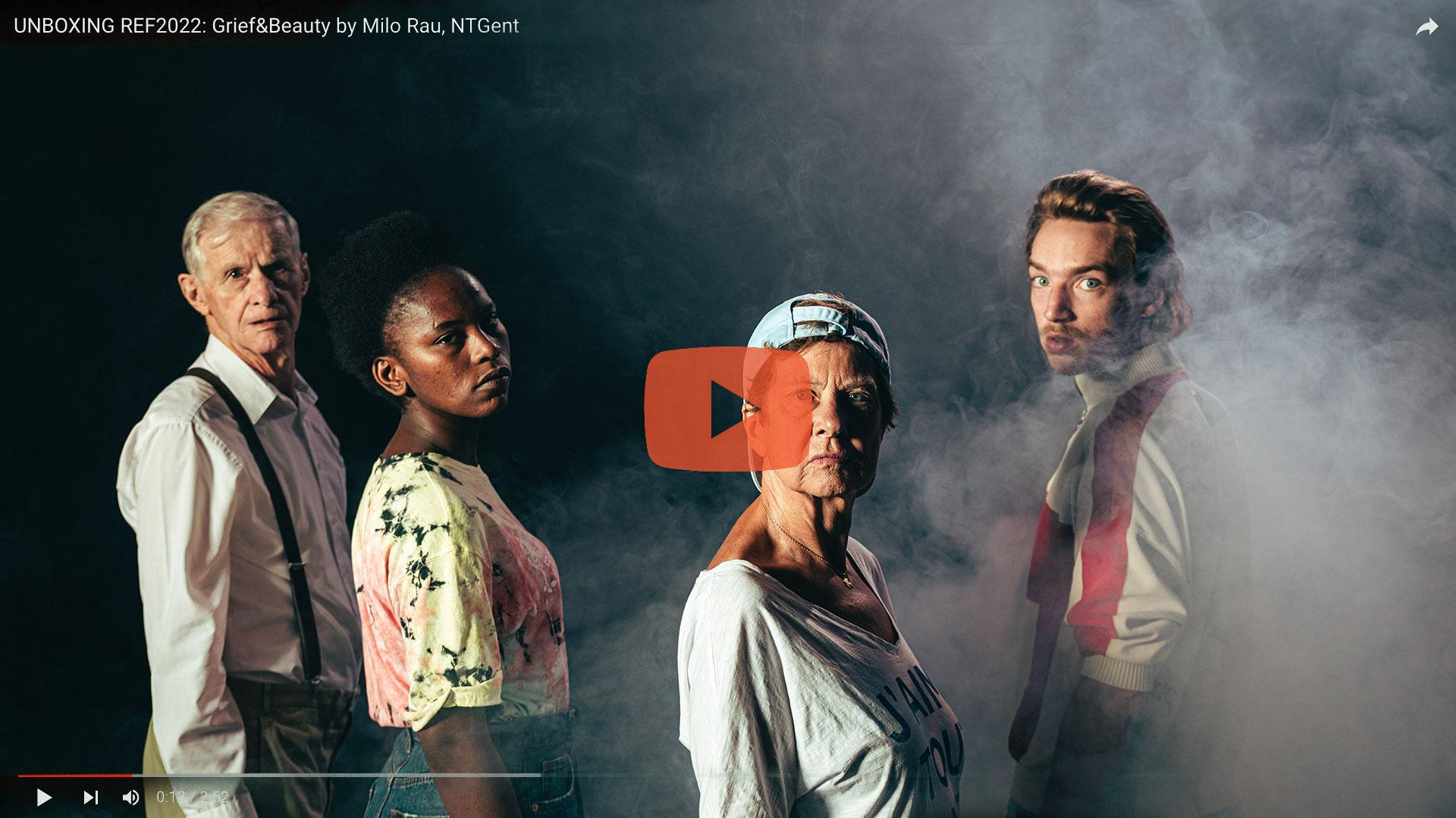ITA / ENG
LŌĆÖunboxing di questa settimana ├© una nuova tappa nel teatro internazionale protagonista del festival: una mappa costellata di sguardi e di voci che raccontano il nostro presente raccogliendo narrazioni collettive, percorsi storici e intimit├Ā. Dalla compagnia messicana Lagartijas Tiradas al Sol, al ritorno di Alexander Zeldin (in corealizzazione con il Teatro di Roma) e Caroline Guiela Nguyen passando per Roduan Mriziga con Doroth├®e Munyaneza, Rabih Mrou├® (in corealizzazione con il MAXXI) e molti altri ancora.
Fa parte di questa mappa anche il ritorno di Milo Rau, con il quale Romaeuropa prosegue un percorso di collaborazioni e coproduzioni. Dopo The Repetition Histoire(s) due Th├®atre (REF 2018), The Congo Tribunal (film, 2018), Orestes in Mosul (REF 2019) e Familie (REF2020) lŌĆÖacclamato regista svizzero torna al festival con Grief & Beauty (coproduzione REF2022) che ci racconta in questa newsletter.
┬½Si tratta della seconda parte di quella che ho definito ŌĆ£trilogia della vita privataŌĆØ: unŌĆÖopera intima che allŌĆÖinterno della mia produzione pi├╣ politica, prosegue il percorso avviato con Familie┬╗ afferma il regista. Dopo il misterioso suicidio di unŌĆÖintera famiglia, raccontato con delicatezza e poesia in questo ultimo spettacolo, magma di interrogativi sullŌĆÖesistenza e sulla sua fragilit├Ā, Grief & Beauty continua ad affrontare la questione dellŌĆÖaddio, del lutto, della morte ma anche della memoria e della solidariet├Ā dinanzi ai momenti finali di unŌĆÖesistenza. Quattro attrici e attori dialogano con una donna che ha deciso di procedere allŌĆÖeutanasia e condividono con lei le loro storie personali di addio e rinascita, amore e arte, memoria e oblio. ┬½La scena ├© un appartamento allŌĆÖinterno del quale ascoltiamo la storia di quattro persone a proposito del dolore, della bellezza della vita ma anche della bellezza e dei problemi che ruotano intorno alla perdita┬╗ continua il regista ┬½In video vediamo Johanna una donna che abbiamo conosciuto e a cui abbiamo dedicato questo spettacolo. Ha deciso di chiudere la sua esistenza attraverso lŌĆÖeutanasia, legale in Belgio. In una parte dello spettacolo assistiamo a questa morte e allo stesso tempo conosciamo la sua storia e la sua vita┬╗.
Come raccontiamo la morte mentre siamo in vita? E cosŌĆÖ├© per noi la fine? Come possiamo soffrire e scomparire? Racconta il regista, intervistato dalla drammaturga Carmen Hornbostel per NTGent: ┬½Durante la ricerca iniziale per lo spettacolo abbiamo notato qualcosa di strano: sembra che la repressione della propria morte, del proprio essere creaturali sia il riflesso individuale di una repressione molto pi├╣ ampia: dellŌĆÖepocale scomparsa della vita, della cosiddetta ŌĆ£sesta estinzione di massaŌĆØ nellŌĆÖAntropocene. ├ł come se si stesse verificando non solo una scomparsa ma unŌĆÖamnesia: chi ├© giovane oggi non sa nemmeno cosa abbiamo perduto, non avendo mai conosciuto gli uccelli, gli insetti, i paesaggi che sono scomparsi. Credo che Grief & Beauty cerchi di stabilire una connessione tra diverse forme di scomparsa e lutto: la scomparsa delle specie animali, degli ambienti di vita, dei linguaggi, della memoria e dell’esistenza individuale. Tutto questo in storie concrete che abbiamo vissuto e raccontato durante la ricerca e le prove (ŌĆ”). Nel teatro lŌĆÖindividuale e il generale, il banale e l’estetico, la memoria e l’esistenza, il recitato e il veritiero, nel migliore dei casi, si incontrano. Da qualche parte Heiner M├╝ller ha affermato: ŌĆ£Il teatro ├© il luogo in cui i vivi entrano in dialogo con i mortiŌĆØ. Penso che sia vero, e penso che tutte le mie opere riguardino questo dialogo, questo desiderio, quasi orfico, di vincere la morte attraverso il canto. Familie parlava di unŌĆÖassenza di fondo della nostra societ├Ā, della mancanza del trascendentale e dei rituali dinanzi ai catastrofici cambiamenti dei tempi che viviamo. Penso che Grief & Beauty sia una risposta a Familie. LŌĆÖintero spettacolo ├©, in fondo, un rituale: una celebrazione intima e pre-politica di ci├▓ che ├© ŌĆ£collettivoŌĆØ. Lo si intuisce, ad esempio, nellŌĆÖimportante ruolo che la musica e i suoni svolgono nello spettacolo: ├© come se la quotidianit├Ā ŌĆō lŌĆÖacqua di un bagno, il suono di una macchina da caff├©, il tintinnio di un pianoforte, lŌĆÖululato dei lupi ŌĆō iniziassero a cantare insieme┬╗. Cos├¼ Rau d├Ā vita a unŌĆÖaltra produzione controversa, radicale e allo stesso tempo poetica e tenera, capace di tendersi al limite di ci├▓ che pu├▓ essere rappresentato sulla scena e di trascendere il reale per raccontare lŌĆÖuniversale fragilit├Ā dellŌĆÖumano e la sua bellezza.
ENG
This week’s unboxing proposes a new focus on the international theater that will be hosted by the festival: a map dotted with gazes and voices that tell our present through collective narratives, historical paths and intimacy. From the Mexican company Lagartijas Tiradas al Sol to the return of Alexander Zeldin (in corealization with il Teatro di Roma) and Caroline Guiela Nguyen, passed by Roduan Mriziga with Doroth├®e Munyaneza, Rabih Mrou├® (in corealization with MAXXI) and many more. ItŌĆÖs a part of this map also the return of Milo Rau, with whom Romaeuropa continues a path of collaborations and co-productions. After The Repetition Histoire (s) due Th├®atre (REF 2018), The Congo Tribunal (film, 2018), Orestes in Mosul (REF 2019) and Familie (REF2020), the acclaimed Swiss director returns to the festival with Grief & Beauty (co-production REF2022). He has told us something more about this work:
┬½This is the second part of what I have called ŌĆ£The Trilogy of Private Life“: an intimate work that, within my more political production, continues the path started with Familie┬╗ says the director. After the mysterious suicide of an entire family, told with delicacy and poetry in this last show – a magma of questions about existence and its fragility – Grief & Beauty continues to address the issue of farewell, mourning, death but also of memory and solidarity in the face of the final moments of an existence. Four actors talk to a woman who has decided to commit assisted-suicide and share with her their personal stories of farewell and rebirth, love and art, memory and oblivion. ┬½The scene is an apartment in which we listen to the story of four people about pain, the beauty of life but also about the beauty and problems of death” continues the director “In the video we see Johanna the woman who we have met and to whom we have dedicated this show. She has decided to end her existence through euthanasia, that is legal in Belgium. In one part of the performance, we witness this death and at the same time we know her story and her life┬╗.
How do we talk about death while we are alive? And what is the end for us? How can we suffer and disappear? Says the director, interviewed by playwright Carmen Hornbostel for NTGent: ┬½During the initial research, we noticed something strange: It seems as if the repression of one’s own death, of one’s own creatureness (ŌĆ”) is an individual reflection of a much larger repression: of global dying, of the epochal disappearance of life, of the so-called ŌĆśSixth Mass ExtinctionŌĆÖ in the Anthropocene. It is almost as if not only a disappearance, but an amnesia is taking place: Those who are young today do not even know what we have lost, having never known the birds, insects, landscapes that have disappeared. Grief & Beauty thus tries, I think, to establish a connection between different forms of disappearance and grieving: the disappearance of animal species, of life environments, of languages, of individual memory and existence. All this in concrete stories that we experienced and told each other during the research and rehearsals. (ŌĆ”). In theatre, the individual and the general, the banal and the aesthetic, memory and existence, the played and the truthful, all come together in the best case. Heiner M├╝ller said somewhere: ŌĆ£Theatre is the place where the living enter into dialogue with the deadŌĆØ. I think that’s true, and I think all my plays are about this dialogue ŌĆö about this Orpheusian desire to overcome death through singing, you could say. Familie is about the bottomlessness of our society, about the transcendental lack of ritual in the face of the catastrophic turn of times we are in. I think that Grief & Beauty is, in a way, a response to Familie. The whole piece, you could say, is one ritual: an intimate, pre-political celebration of the collective. For example, in the important role that music and sounds in general play: It is as if the everyday ŌĆö the water of a bath, the sound of a coffee machine, the tinkling on a piano, the howling of wolves ŌĆö begin to ŌĆśsingŌĆÖ together┬╗. Thus, Rau gives life to another controversial, radical and at the same time poetic and tender production, capable of stretching itself to the limit of what can be represented on the stage and of transcending the real to tell the universal fragility of the human and its beauty.
















